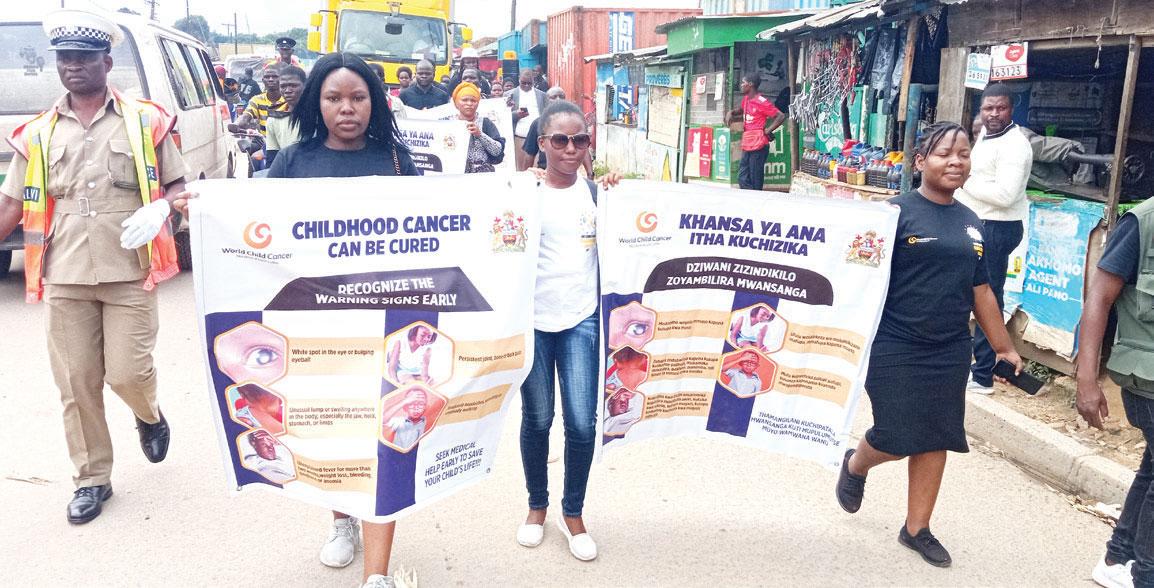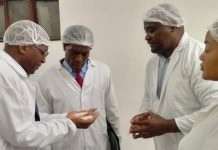Africa-Press – Malawi. The statistics are damning: Only 500 out of the estimated 1,000 children who develop cancer each year in Malawi seek medical diagnosis. This means 500 others suffer ignorantly and, sometimes, die ignorantly.
Head of Pediatrics and Child Health at Queen Elizabeth Central Hospital in Blantyre, Dr George Chagaluka, described the situation as worrisome when we caught up with him at Nyambabwe Ground in Ndirande, Blantyre, on Wednesday.
On the day, people were commemorating International Childhood Cancer Day, which is observed on February 15. “Childhood cancer remains one of the leading causes of death among children.
“The good news is that the disease is curable,” he said. Chagaluka said one of the important ways of reducing the risk of death from cancer is early diagnosis.
“Early diagnosis is one of the most effective ways of reducing cases of mortality from childhood cancer,” Chagaluka said. World Child Cancer Programme Coordinator Richard Peter Sabawo concurred, adding that there is a need to raise awareness on the disease.
“We have to raise our voices and envision a day when all children with cancer will benefit from the best possible treatment, care and support regardless of where they live,” he said.
Sabawo indicated that early detection and proper medical care can go a long way in helping people prevent cancer deaths in children. “There is a need to intensify action through advocacy, leveraged financing, and governance,” Sabawo said.
According to Ministry of Health Head of Non Communicable Diseases and Mental Health Dr Jonathan Chiwanda, people should not lose hope when their children are diagnosed with cancer.
“The survival rate for pediatric cancer is very high. It is different from cancer in adults because the pediatric cancer cure rate is very high depending on early diagnosis.
“We just need to promote early diagnosis and link those that have been diagnosed with cancer to care [centres].The survival rate is far good; it is around 80 percent,” he said.
Other stakeholders, notably Head of Paediatric and Ecology at Kamuzu Central Hospital (KCH) in Lilongwe Dr Nmazuo Ozuah, are optimistic that Malawi may rid itself of the menace that is childhood cancer.
He said the hospital is, in collaboration with the Ministry of Health, showing gradual progress every year when it comes to the fight against childhood cancer.
“We have been here for five years now and we are working hand-in-hand with the Ministry of Health and KCH. We appreciate the progress we have made,” he said.
One of the cancer survivors, Mark Labson, assured Malawians, especially those that have been diagnosed with cancer, that there is a high possibility that one can survive if they follow medical experts’ advice.
“Malawians that have been diagnosed with cancer should make sure that they follow all the instructions given by doctors as well as trust in God,” he said. She is not the only one who believes that a cancer diagnosis is not a death sentence.
Regina Lungu, mother to seven-year-old lymphoma cancer survivor Geshom Lungu, who was diagnosed with cancer when he was three years, said his son is now fully healthy after being cured from cancer. This can be attributed to the quick action he took when he observed some strange features on his son’s body.
“When I noticed some unusual growth of tumor on the chicks of my son, I took him to Queen Elizabeth Central Hospital, and not just to a mere pharmacy where medicines are sold anyhow. Now my son is in standard 3 and healthy after being cured,” he said.
Lungu urged other parents and guardians to be taking their children to the hospital when they observe unusual features on their bodies. “This will allow for early diagnosis and treatment,” Lungu said.
For More News And Analysis About Malawi Follow Africa-Press






